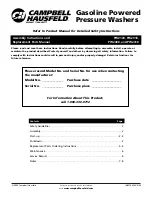
10
GB
Care and maintenance
Cutting off the water or electricity supply
• Turn off the water tap after every wash. This will limit
the wear of your appliance’s water system and also
prevent leaks.
• Unplug your appliance when cleaning it and during all
maintenance operations.
Cleaning your appliance
The exterior and rubber parts of your appliance can be
cleaned with a soft cloth soaked in lukewarm soapy water.
Do not use solvents or abrasives.
Caring for your appliance door and drum
• Always leave the appliance door ajar to prevent unplea-
sant odours from forming.
Cleaning the pump
The washing machine is fitted with a self-cleaning pump
that does not require any maintenance. Sometimes, small
items (such as coins or buttons) may fall into the pre-
chamber that protects the pump, situated in the lower part
of the same.
!
Make sure the wash cycle has ended and unplug the
appliance.
How to clean the detergent dispenser
Cleaning:
Then clean the dispenser under a tap
(fig. 3)
using an old
toothbrush and, once the pair of siphons inserted in the top
of compartments 1 and 2
(fig. 4)
have been pulled out, check
whether the same are not clogged and then rinse them.
Reassembly:
Do not forget to reinsert the
pair of siphons into the special
housings and then to replace
the dispenser into its seat, click-
ing it into place
(fig. 4, 2 and 1).
Disassembly:
Press lightly on the large
button on the front of the
detergent dispenser and pull
it upwards
(fig. 1, 2).
To recover any objects that have fallen into the pre-chamber:
1. remove the plinth at the
bottom on the front side
of the washing machine
by pulling from the side
with your hands
(see
figure)
;
2. unscrew the lid rota-
ting it anticlock-wise
(see
figure)
: a little water may
trickle out. This is perfect-
ly normal;
3. clean the interior tho-
roughly;
4. screw the lid back on;
5. reposition the panel,
making sure the hooks are
securely in place befo-
re you push it onto the
appliance.
Checking the water inlet hose
Check the water inlet hose at least once a year. If you see
any cracks, replace it immediately: during the wash cycles,
water pressure is very strong and a cracked hose could
easily split open.
!
Never use hoses that have already been used.
Fig. 1
Fig. 2
Fig. 3
Fig. 4











































